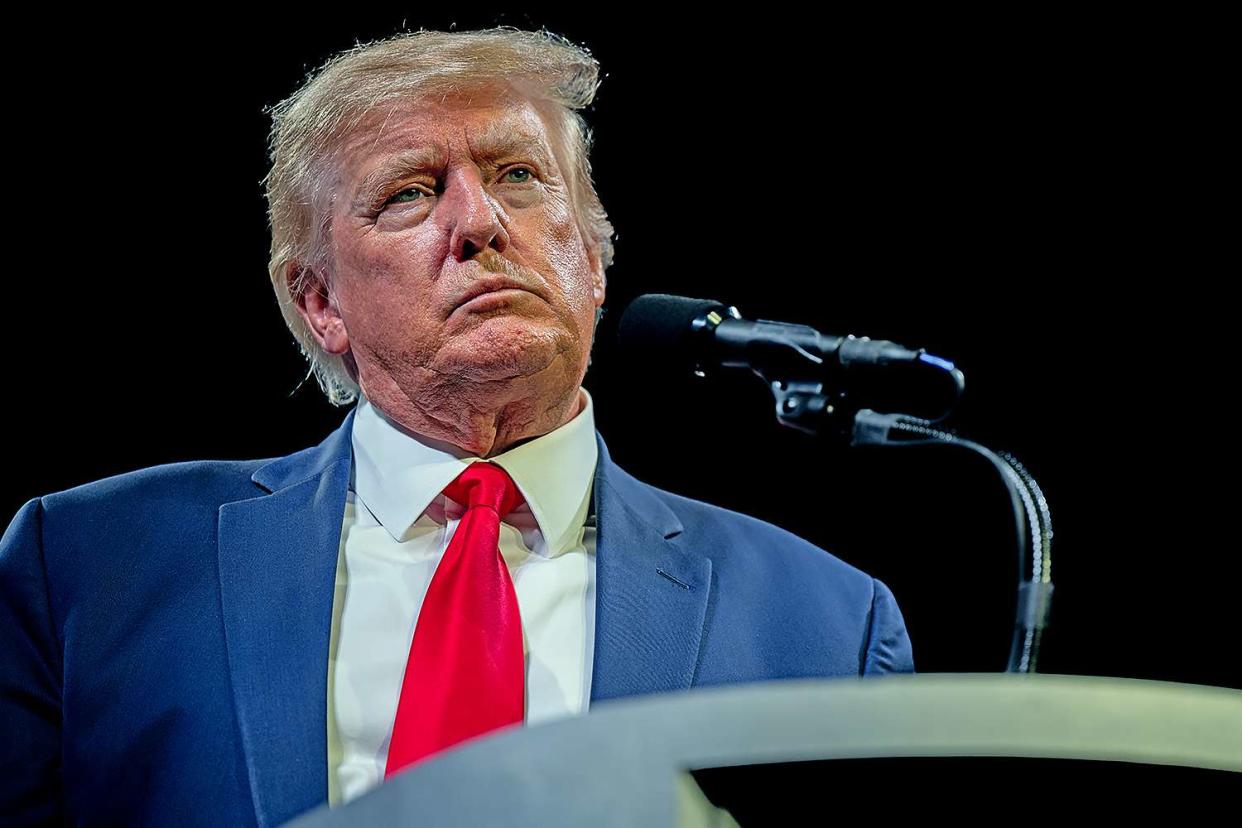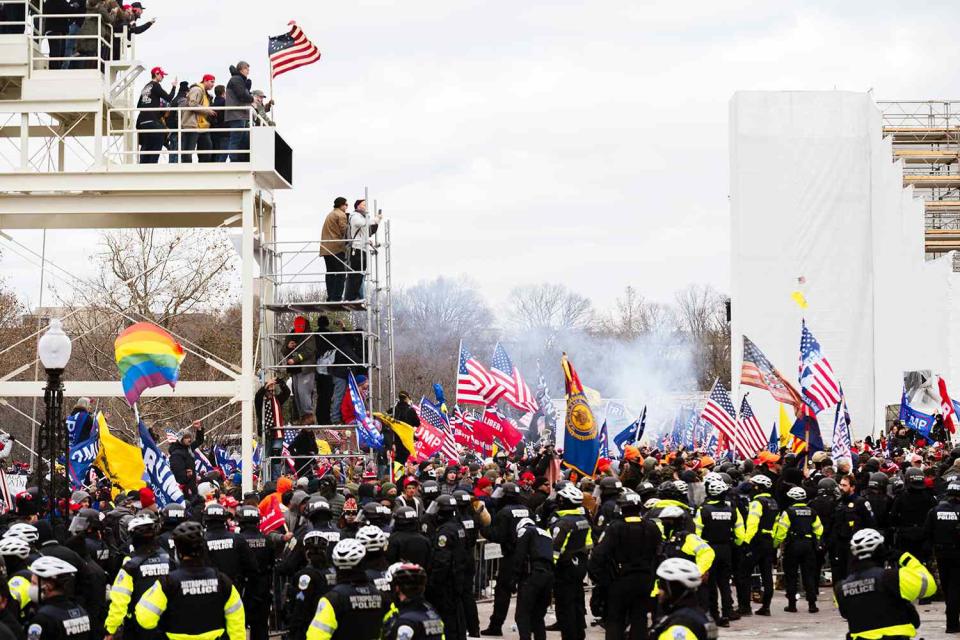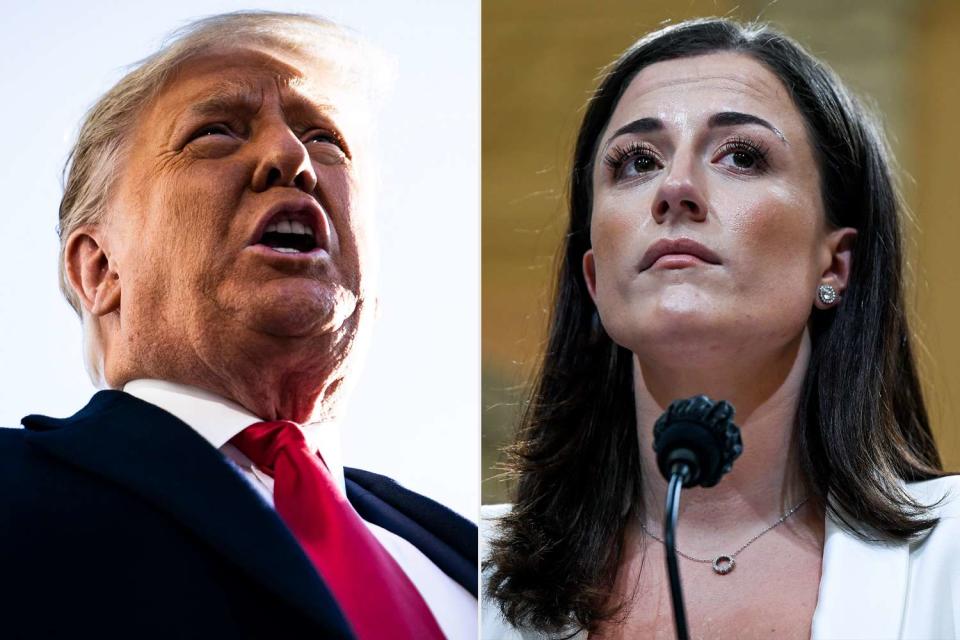Conservative Lawyer Pitched Trump Plans to Overturn 2020 Presidential Election: 'Your Solemn Duty'

- Oops!Something went wrong.Please try again later.
- Oops!Something went wrong.Please try again later.
- Oops!Something went wrong.Please try again later.
- Oops!Something went wrong.Please try again later.
Brandon Bell/Getty Donald Trump
Former President Donald Trump had a lawyer encouraging his ideas of overturning the 2020 presidential election a month after President Joe Biden's victory.
While Trump, 76, was at his Mar-a-Lago home in Palm Beach, Florida, on Christmas Day 2020, conservative lawyer William J. Olson promoted several extreme ideas to the then-president over the phone, The New York Times reported. Olson, who later conceded his plans, revealed that they included tampering with the Justice Department and firing attorney general Jeffrey A. Rosen, the outlet reported.
In a December 28 memo from Olson that was obtained by the Times, he said, "The media will call this martial law," which he described would be "fake news."
Titled "Preserving Constitutional Order," the memo also stated that Trump should justify his actions as a way "to preserve the election process." Olson continued, "This is not just within your power, it is your solemn duty."
As more evidence of Trump's attempt to overturn the 2020 election arises, there are further comparisons between his grip on power and Nixon's Watergate scandal. In 1974, former President Nixon resigned after being linked to break-ins at the Democratic National Committee headquarters in the Watergate complex in Washington D.C. as part of efforts to guarantee his reelection.
In an essay published in The Washington Post last month, Bob Woodward and Carl Bernstein, the journalists who did much of the original reporting on the Watergate scandal, said Trump's "diabolical" actions culminated in "a deception that exceeded even Nixon's imagination."
"Trump and a group of lawyers, loyalists and White House aides devised a strategy to bombard the country with false assertions that the 2020 election was rigged and that Trump had really won," the political journalists outlined. "They zeroed in on the Jan. 6 session as the opportunity to overturn the election's result."
Woodward and Bernstein continued, "We watched in utter dismay as Trump persistently claimed that he was really the winner." They also noted the pressure that. then-Vice President Mike Pence was under when Trump pressured him to "make him the victor on Jan. 6."

Jon Cherry/Getty Images Riots at the U.S. Capitol building on Jan. 6
RELATED: Secret Service Erased Text Messages from Jan. 6 Following Capitol Riot, Inspector General Says
The timing of Olson's memo is particularly important given the ongoing Jan. 6 hearings. Cassidy Hutchinson recently testified that Trump physically assaulted a secret service agent in an attempt to reach the Capitol during the riots.
The former White House aide said she heard from Trump's head of Secret Service, Robert Engel, that Trump expressed an interest in traveling to the Capitol, but that his security was against the idea.
So Trump, she testified under oath, took matters into his own hands.
Hutchinson said in her testimony that Deputy Chief of Staff Tony Ornato told her how when Trump got in his presidential limousine following his speech, "He was under the impression that he could still go to the Capitol."
"When [Engel] relayed, 'We are not ... it's not secure,' the president had a very strong, very angry response to that ... Tony described him as being irate," she said.
According to Hutchinson, Engel said that Trump yelled, "I'm the f------ president, take me up to the Capitol now," to which Engel responded, "Sir, we have to go back to the West Wing."
"The president then reached up to grab at the steering wheel," Hutchinson said during a hearing on the events of Jan. 6.
She stated that Engel grabbed Trump's arm to tell him not to take over the steering wheel, then Trump grabbed at Engel's "clavicle," gesturing to her own throat.

Jabin Botsford/The Washington Post via Getty; Brandon Bell/Getty Donald Trump, Cassidy Hutchinson
Information on the vice president and the Secret Service was revealed in the testimony of Greg Jacob, a former adviser of the VP, CNN reported. Jacob told the panel that Pence, 63, refused to get into the vice presidential vehicle after being evacuated from the Capitol by the Secret Service.
"I'm not getting in the car," Pence reportedly told the agent, the Post reported. "If I get in that vehicle, you guys are taking off." His insistence was crucial because if he had entered the vice presidential limo, he would have been unable to certify the presidential election results, making the attempted coup even more likely.
During the fifth public hearing held by the committee, Justice Department officials took the witness stand to detail Trump's unrelenting pressure to find evidence of widespread fraud in the 2020 presidential election.
Testifying were Jeffrey Rosen, the acting attorney general brought in after Bill Barr resigned; Richard Donoghue, the acting deputy attorney general at the time of the insurrection; and Steven Engel, the assistant attorney general for the Office of Legal Counsel at the time.
During the time that Rosen was brought in as attorney general in December 2020, he said he faced pressure almost daily to uncover evidence that Biden and the Democrats had stolen the 2020 presidential election. Barr, after all, had just fallen from grace in Trump's eyes after publicly stating that the DOJ could not corroborate the president's election fraud claims.
"Between Dec. 23 and Jan. 3, the president either called me or met with me virtually every day, with one or two exceptions," Rosen testified. "The common element of all of [these meetings] was the president expressing his dissatisfaction that the Justice Department had not done enough to investigate election fraud."
Never miss a story — sign up for PEOPLE's free daily newsletter to stay up-to-date on the best of what PEOPLE has to offer, from juicy celebrity news to compelling human interest stories.
Rosen said that the Justice Department declined all of Trump's requests of them to declare fraud, "because we did not think that they were appropriate based on the facts and the law as we understood them."
Donoghue echoed Rosen's testimony, telling the House committee that Trump was fixated on verifying a few rumored instances of fraud in swing states.
Asked by Rep. Adam Kinzinger, one of two Republicans on the Jan. 6 committee, if any of those rumors were found to be credible, Donoghue simply responded, "No."

